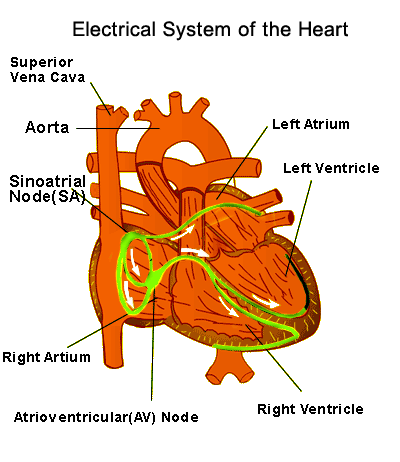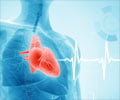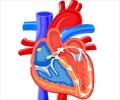- Ventricular tachycardia - (http://www.nlm.nih.gov/medlineplus/ency/article/000187.htm)
- Incidence of arrhythmias in normal pregnancy and relation to palpitations, dizziness, and syncope - (http://www.ncbi.nlm.nih.gov/sites/entrez?cmd=retrieve& db=pubmed&list_uids=9114764&dopt=abstractplus)
- A Study of Caffeine Consumption and Symptoms: Indigestion, Palpitations, Tremor, Headache and Insomnia - (http://ije.oxfordjournals.org/cgi/content/abstract/14/2/239)
About palpitations
Palpitations are unpleasant sensations of one's own heartbeat.
People describe palpitations in various ways, such as racing heartbeat, fast heartbeat, and fluttering or skipped beat. Most palpitations are harmless; however if they occur regularly a check up is warranted.
Palpitations are the most common symptom of arrhythmia when there is a problem in the heart's conduction system. Not all heart palpitations are dangerous. Sometimes it can reflect a problem not in the heart but somewhere else in the body (like the thyroid).

The heart is a muscular tissue with four chambers for receiving and pumping out blood. These chambers have to beat in synchronization throughout our life - almost 20 billion times. To provide this synchronization there are specific pace-making areas that emit regular electrical impulses that are transmitted to the cardiac muscles. The main electrical impulses are generated in the right upper chamber of the heart [Right atrium] by the sino-atrial node. This node is called the pacemaker of the heart. First, the electrical ions or the charged cells move throughout the atrium causing the muscles to contract. This contraction causes blood to fill the lower chambers of the heart [ventricles]. A second power station called the AV node [atrio-ventricular node], is present between the atria and the ventricles. This allows the ventricles to fill completely. Once the impulses travel down the ventricles, they contract pumping blood to the body. This whole cycle is one heartbeat or cardiac cycle. A normal heart beats about 60-100 times per minute. In general, the heart rate increases with exertion or physical or emotional activity and reduces at rest. An electrocardiogram can record these electrical impulses as waveforms.
Palpitations occur differently in different people. Everybody encounters an extra beat or two often. Most people are unaware of it. These ectopic beats are not harmful and do not pose danger or damage to your heart. In England, over 700,000 people have palpitations. Palpitations that are infrequent and not associated with any other symptoms may not require further investigations. However, patients with frequent palpitations associated with symptoms such as shortness of breath, dizziness or syncope (loss of consciousness) need to be checked by a physician.
Implantable Loop Recorder (ILR) or Insertable Cardiac Monitor is a small implantable devicewhich monitors electrical heart activity and records the arrhythmias.






















